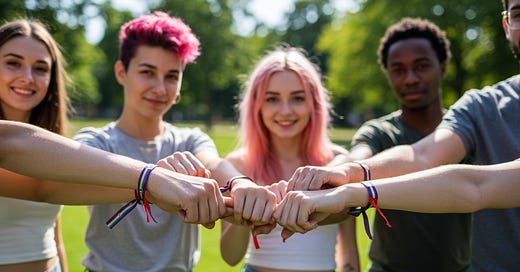For many in the LGBTQ+ community, the concept of "straight allies" evokes mixed feelings. Some of us have experienced performative allyship, seen straight people center themselves in our spaces, or watched allies receive praise for basic decency while we fight for our fundamental rights. If you've ever rolled your eyes at the sight of another straight person in a "Ally" t-shirt at Pride, this article is for you.
Why Hesitation Is Valid
Let's acknowledge the elephant in the room: skepticism toward straight allies often comes from genuine places of hurt and frustration. Many of us have legitimate reasons for our wariness:
History of Performative Support: We've seen allies who show up for Pride parades but remain silent when their coworkers make homophobic jokes.
Space Invasion: We've watched as straight people claim increasingly prominent roles in spaces created specifically as sanctuaries for our community.
Unearned Praise: We've witnessed allies receive accolades for basic human decency while our activism is labeled "too aggressive" or "divisive."
Conditional Allyship: We've experienced supporters who back away when our existence becomes politically inconvenient or when standing with us requires genuine sacrifice.
These experiences are real, and they matter. The skepticism they've created isn't unfounded.
The Case for Reconsidering Allyship
Despite these valid concerns, I want to make a case for a nuanced approach to allyship—one that holds allies accountable while recognizing their potential value to our movement.
The Practical Reality of Numbers
Purely from a strategic standpoint, LGBTQ+ people make up a minority of the population—somewhere between 5-10% depending on age demographics and how surveys are conducted. Creating lasting social change requires broader coalitions. Straight and cisgender allies who vote, donate, volunteer, and advocate alongside us multiply our impact.
The Power of Insider Advocacy
Allies often have access to conversations and spaces we don't. When a straight person challenges homophobia at a family dinner or in a workplace meeting where no LGBTQ+ people are present, they're fighting battles we literally cannot fight ourselves. This "insider advocacy" can be extraordinarily powerful.
The Exhaustion Factor
The burden of education and advocacy shouldn't fall solely on LGBTQ+ shoulders. We're often expected to be both the victims of discrimination and the full-time unpaid educators solving it. Strategic partnerships with committed allies can help share this exhausting load.
What Meaningful Allyship Actually Looks Like
The distinction between performative and meaningful allyship is crucial. Genuine allies:
Listen more than they speak in LGBTQ+ spaces and discussions
Continue learning without expecting us to be their personal educators
Use their privilege to advocate in spaces where our voices might be dismissed
Accept criticism without defensiveness when they misstep
Stand with us even when it's uncomfortable or inconvenient
Understand that allyship is about actions, not identity or labels
Creating a Productive Relationship
If we want to foster meaningful allyship while protecting our community's needs, consider these approaches:
Set Clear Boundaries
Be explicit about expectations in LGBTQ+ spaces. There's nothing wrong with designating certain events or discussions as "community only" while creating other opportunities for allies to engage. Clear communication prevents misunderstandings.
Provide Specific Action Items
Rather than generic "be an ally" advice, offer concrete actions allies can take: "Call your representative about this specific bill," "Attend this school board meeting," or "Share these resources with your workplace."
Recognize Genuine Effort
While we shouldn't hand out participation trophies for basic decency, acknowledging allies who consistently show up, learn from mistakes, and put in meaningful work helps reinforce positive behavior. Constructive feedback works better than permanent skepticism.
Connect Allies to Each Other
Encourage allies to educate other potential allies, creating networks of support that don't constantly drain LGBTQ+ emotional energy.
A Personal Reflection
I've experienced my share of frustrating interactions with self-proclaimed allies. I've also witnessed straight people put their reputations, relationships, and sometimes even safety on the line to stand with our community. The reality is complex.
The question isn't whether we should welcome allies—it's how we welcome them in ways that strengthen rather than dilute our movement. We need supporters who understand that allyship isn't about collecting progressive credentials but about joining a fight for justice that affects us all differently.
The most effective allies don't need to be centered or celebrated. They understand that true allyship often means using their privilege to amplify our voices and then stepping back. Finding these allies—and helping well-meaning but misguided supporters become these allies—is worth the effort.
Our community has always been stronger when we build bridges without compromising our integrity. Strategic, accountable allyship doesn't mean abandoning our boundaries—it means creating pathways for meaningful solidarity in a struggle that ultimately benefits everyone who believes in a more just and equitable world.




